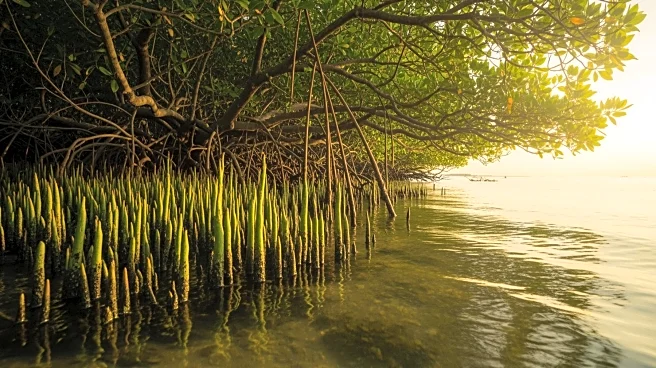What's Happening?
A comprehensive study has been conducted to explore the biodiversity and ecosystem services provided by mangrove forests globally. The research highlights the critical role mangroves play in supporting
diverse species, storing carbon, and protecting coastal areas. Mangroves are identified as vital habitats for both marine and terrestrial fauna, offering protection and resources that contribute to ecological balance. The study also emphasizes the importance of mangroves in carbon sequestration, which is crucial for mitigating climate change impacts. Additionally, the research points out the threats faced by mangrove ecosystems, including deforestation and climate change, which could undermine their ability to provide these essential services.
Why It's Important?
Mangrove ecosystems are crucial for maintaining biodiversity and providing ecosystem services that benefit both the environment and human communities. They act as natural barriers against coastal erosion and flooding, thus protecting coastal populations and infrastructure. The carbon storage capacity of mangroves is significant in the fight against climate change, as they can sequester large amounts of carbon dioxide. The loss of mangroves due to human activities and climate change poses a threat to these benefits, potentially leading to increased vulnerability of coastal areas and loss of biodiversity. Understanding and preserving mangrove ecosystems is essential for sustainable development and environmental conservation.
What's Next?
Efforts to conserve and restore mangrove ecosystems are likely to increase, with a focus on sustainable management practices that balance ecological health with human needs. Policymakers and environmental organizations may prioritize mangrove conservation in climate action plans, recognizing their role in carbon sequestration and coastal protection. Research and monitoring will continue to assess the health of mangrove ecosystems and the effectiveness of restoration efforts. Collaboration between governments, NGOs, and local communities will be crucial in implementing strategies that protect these vital ecosystems.
Beyond the Headlines
The study underscores the ethical responsibility to protect mangrove ecosystems, which are often overlooked despite their importance. There is a cultural dimension to mangrove conservation, as these ecosystems are integral to the livelihoods and traditions of many coastal communities. The degradation of mangroves not only impacts biodiversity but also the cultural heritage and economic stability of these communities. Long-term conservation strategies must consider these cultural and social factors to ensure the sustainable use and protection of mangrove resources.










